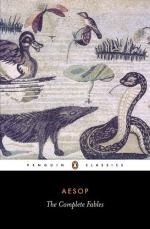A Nobleman announced his intention of giving a public entertainment in the theatre, and offered splendid prizes to all who had any novelty to exhibit at the performance. The announcement attracted a crowd of conjurers, jugglers, and acrobats, and among the rest a Clown, very popular with the crowd, who let it be known that he was going to give an entirely new turn. When the day of the performance came, the theatre was filled from top to bottom some time before the entertainment began. Several performers exhibited their tricks, and then the popular favourite came on empty-handed and alone. At once there was a hush of expectation: and he, letting his head fall upon his breast, imitated the squeak of a pig to such perfection that the audience insisted on his producing the animal, which, they said, he must have somewhere concealed about his person. He, however, convinced them that there was no pig there, and then the applause was deafening. Among the spectators was a Countryman, who disparaged the Clown’s performance and announced that he would give a much superior exhibition of the same trick on the following day. Again the theatre was filled to overflowing, and again the Clown gave his imitation amidst the cheers of the crowd. The Countryman, meanwhile, before going on the stage, had secreted a young porker under his smock; and when the spectators derisively bade him do better if he could, he gave it a pinch in the ear and made it squeal loudly. But they all with one voice shouted out that the Clown’s imitation was much more true to life. Thereupon he produced the pig from under his smock and said sarcastically, “There, that shows what sort of judges you are!”
THE LARK AND THE FARMER
A Lark nested in a field of corn, and was rearing her brood under cover of the ripening grain. One day, before the young were fully fledged, the Farmer came to look at the crop, and, finding it yellowing fast, he said, “I must send round word to my neighbours to come and help me reap this field.” One of the young Larks overheard him, and was very much frightened, and asked her mother whether they hadn’t better move house at once. “There’s no hurry,” replied she; “a man who looks to his friends for help will take his time about a thing.” In a few days the Farmer came by again, and saw that the grain was overripe and falling out of the ears upon the ground. “I must put it off no longer,” he said; “This very day I’ll hire the men and set them to work at once.” The Lark heard him and said to her young, “Come, my children, we must be off: he talks no more of his friends now, but is going to take things in hand himself.”
Self-help is the best help.




